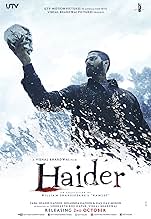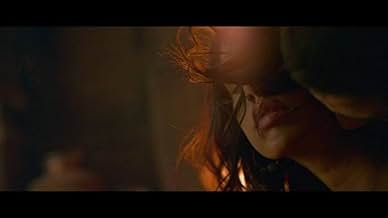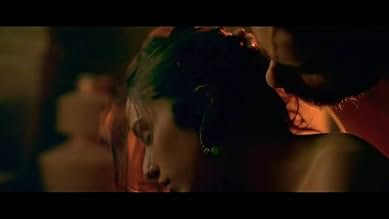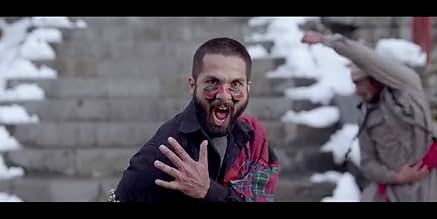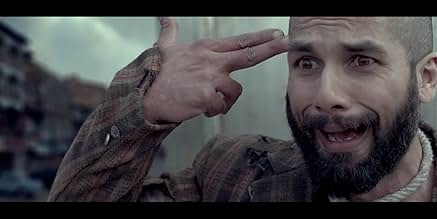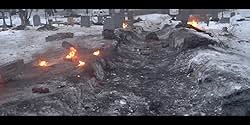Adicionar um enredo no seu idiomaA young man returns to Kashmir after his father's disappearance to confront his uncle, whom he suspects of playing a role in his father's fate.A young man returns to Kashmir after his father's disappearance to confront his uncle, whom he suspects of playing a role in his father's fate.A young man returns to Kashmir after his father's disappearance to confront his uncle, whom he suspects of playing a role in his father's fate.
- Direção
- Roteiristas
- Artistas
- Prêmios
- 35 vitórias e 47 indicações no total
- Ikhwan Commander
- (as Muzzamil Bhavani)
Avaliações em destaque
By the mid-1990s, Kashmir had taken the form of a like a spewing volcano, a ticking time bomb ready to go kablooey at any given moment. The terrorist insurgency in the Kashmir valley had started to pose a serious threat to India's sovereignty and the army had to be given a carte blanche so as to guard the country against any possible threat from both within and as well as outside the country. The people of Kashmir started seeing the growing military activity in the region as a violation of their basic rights. The separatist leaders saw this as a golden opportunity to galvanize the masses against the state and started adding fuel to fire as the valley got encompassed in a miasma of mistrust. Although, the situation has improved significantly over the last decade, a lot of work still needs to be done before the conflict can be fully resolved. Bhardwaj's film also leaves a strong message not only for people of Kashmir but for all humanity that nothing can be gained through revenge and in the absence of trust.
Adapting a work of Shakespeare is no kid's play. Even the most experienced campaigners can falter if their ambition gets the better of them. The key to adapting any major work of literature is to be wary of one's limitations. Haider is far from being called a perfect adaptation of Hamlet. But, Bhardwaj, to his credit, gets the job done. There are moments of sheer brilliance but there is also a lot of drivel which could have easily been chopped off. Haider has all the makings of an epic but it faces some serious pacing issues towards the second half. Also, the narrative appears to be sketchy at some places. But, that's the price that one must be willing to pay for one's ambition.
One of the main themes of Hamlet is chaos. This chaos is most evident in the play's central character who, in many ways, is a personification of confusion and duality. His highly complex, fascinating albeit bizarre nature makes him a singular character in all literature, endowed with contradictory traits that fade the lines that separate virtue and vice, heroism and villainy, and sanity and madness. In Haider, Vishal Bharadwaj and Shahid Kapoor try their best to grapple with the endless contradictions that define Hamlet's multidimensional character. Oedipus complex is another major theme that runs through Hamlet. The term Oedipus complex denotes the subconscious emotions and ideas that focus upon a child's desire to have sexual relations with the parent of the opposite sex. In Haider the syndrome is both latent and nuanced in comparison to the play.
Haider not only serves as a decent adaptation of Hamlet, but it also proves to be a powerful socio-political commentary on Kashmir of the 1990s. Without the Kashmir angle, Haider would have appeared more empty and existential, with the Shakespearean characters merely playing their parts in a bid to reach the end of the trail. But, with Kashmir as its backdrop, it almost comes across as a propaganda films that aims to serve as a bitter reminder of our not too distant past. Haider is a warning of how easily the youngsters can be brainwashed and led astray by anti-national elements if the state machinery fails to look after them.
While the acting is brilliant all around, it is Tabu who steals the show with a multilayered portrayal that would have guaranteed her an Oscar had Haider been a Hollywood production. Shahid Kapoor's performance in Haider is not perfect but is easily the best of his career, and it comes as no big surprise as Bhardwaj has a reputation to get the best out of his actors. Kay Kay Menon plays his detestable part with the desperation of a mangy scoundrel. Shraddha Kapoor serves well as an eye candy, but, beyond that, not much can be said of her acting. Irrfan Khan is brilliant as ever in the limited screen time that he gets. While the entire support cast does a reasonable job, Narendra Jha, who impresses in the role of Haider's father, deserves a special mention.
Overall, Haider is a dark, distorted and diabolical work of cinematic art that falls well short of attaining perfection. At regular intervals, Bhardwaj tries to lighten up the mood perhaps to satisfy the cravings of the casual viewers. Needless to say, the movie is technically brilliant: cinematography, editing, and music are all at par with the international standards. The movie has several memorable sequences but the ones that stand out are: Shahid Kapoor's monologue, the sequence in which Haider brutally kills his captors, and the final graveyard sequence which may prove to be a real trendsetter as far as Hindi cinema is concerned. Haider is not meant for casual viewers for it will test their patience to the limit. As far as the intelligent viewers are concerned, the movie offers enough food for thought to keep them engaged. Highly recommended!
For more, please visit, A Potpourri of Vestiges.
The instruments Vishal Bharadwaj used for Maqbool and Omkara, are far sharper this time around. The songs are very rustic, and completely of the type to be found in street plays (not even a symbolic nod to Bollywood or a titillation to the audiences with a Bidi). The sense of suspense even sharper (even with a story with a basis as well known as Hamlet). The characters continue to be just as eccentric as in Omkara. And death once again continues to be not an infrequent visitor just like with Omkara. Yet the context is more sombre. And the whole scenario of militancy IMO dealt with quite responsibly with (what I would imagine to be) a good sense of reality.
Not everything is wonderful. On the acting front, Tabu is impressive but understated. Shahid Kapur does well by his standards, but every so often I used to wonder how much better Pankaj Kapur would've done in some of the scenes. Shraddha Kapoor manages the role of pretty innocence well enough, but will probably cringe when she watches her own histrionics. Kay Kay Menon, and Irfan Khan of course are a pleasure to watch, but this is not their best film. While the songs aim to dramatise, I found them underwhelming and unnecessarily melodramatic in this context, Also the film is just a tad too long and could've been shortened by 15-20 minutes.
Be prepared to see a Kashmir which does not look the swiss alps but still deserves to be considered amongst the most beautiful places on earth. This kashmir is a little raw. And forms the milieu for two concurrent threads, one the intra family drama which is the very essence of Hamlet, and the general environment of militancy and counter insurgency. Moreover the plot moves at a fairly measured pace and manages to retain the interest and fascination. It might surprise you (after my earlier paragraph), but these are the reasons why I would classify the movie to be a must watch.
Yeah, go watch this, this is not to be missed, any complaints you might've notwithstanding.
Set in Kashmir it takes the essence of problems faced in Kashmir valley due to insurgency and counterinsurgency measures though it doesn't focus on the problem alone. In a broad sense this movie is about search of a father by a son and subsequent events which leads him nearer towards revenge.
First of all the movie is not everybody's cup of tea. You've to be very patient throughout to get the real pleasure out of it. The film is slow paced so as to draw you into it, just like an old wine. And, like an old wine you are supposed to sip it and not drink it in a hurry.
The ensemble actor list is itself worth mentioning from Shahid ,Shradhha,Kulbhushan Kharbanda to the talented KK Menon,Tabu and of course the ever reliable Irfan Khan. Their performance is indeed flawless in the movie.The relationships are well portrayed ,the agony and trauma well expressed and the hate ,betrayal ,action scenes well-choreographed and scripted(especially the action sequence in the last scene). The only fault I could find in the acting department is that because of the presence of so many good actors (though the movie has good runtime still) much is left to be desired especially from Irrfan Khan whose performance is too succinct for an actor of his caliber.
As said earlier, the movie is slow paced but the script doesn't fail the plot often. There is hardly anytime where you find yourself napping in the movie. Songs are good especially Arjit Singhs voice again creates magic with 'khul kabhi'.Cinematography, background score(which sometimes sound like Bourne trilogy) are also good. Accent training for the actors could have been better as anyone who has visited Kashmir for even a short duration would find only the two Salmaans accent to be genuine. But then it is a minor fault in a movie a cut above rest.
If you are patient and could immerse yourself in the plot ,then the movie holds a lot of promise for you. But wont recommend to those who could not find tickets for another movie or those who want to have party time without application of brain.It is certainly not the best work you will ever see, but certainly a cut above rest, deserving a watch.
Você sabia?
- CuriosidadesShahid Kapoor learnt a six-page monologue for the climatic scene where his character ''Haider'' turns mad. He put forth the delivery of that monologue in front of a crowd of 5000 listening. For filming the scene, which was done in 3-4 hours, Shahid Kapoor was made completely bald.
- Erros de gravaçãoThe film is set in 1995, but two superstar Salman Khan fans do impressions of him from his movies released in the 2000s.
- Citações
Haider: Chutzpah Monologue Hello? Hello? Mic testing 1,2,3... Hello...? Awaz aa rahi hai aap laog ko? Hello, hello, hello, hello, hello? UN council resolution no. 47 of 1948, Article 2 of the Geneva convention, and Article 370 of the Indian Constitution. Bas ek sawaal uthata hai, sirf ek. Hum hai, ya ham nahi. Hum hai to kahan hain , aur nahi hain to kahan gaye ? Hum hain to kisliye aur kahan to kab? Janaaaaab... Hum thay bi, ya hum thay hi nahi? CHUTZPAH ho gaya hamare sath! Chutzpah jante hain aap log? aik baar aik bank k andar Dacoity hoi... Dacoit nay cashier k sir pay pistol rakhi or bola paise day warna maut lay! Cashier ne jhat say oota kar saare paise dacoit ko dey diye Dacoit wohi paise lay kar ugle counter per gaya . *Whistles innocently* Excuse me, ek form dijye mujhay account kholna hay... Yeh hota hai CHUTZPAH! CHUTZPAH!
- ConexõesFeatured in 60th Britannia Filmfare Awards (2015)
- Trilhas sonorasAao Na
Written by Gulzar
Music by Vishal Bhardwaj
Performed by Vishal Dadlani
Produced by Ketan Sodha
Recorded by Salman Khan Afridi @ Studio Satya, Mumbai
Mixed by Stephen Fitzmaurice For 365 Artists
Mastered by Christian Wright @ Abbey Road Studios, London
Principais escolhas
- How long is Haider?Fornecido pela Alexa
Detalhes
Bilheteria
- Orçamento
- ₹ 370.000.000 (estimativa)
- Faturamento bruto nos EUA e Canadá
- US$ 1.048.143
- Fim de semana de estreia nos EUA e Canadá
- US$ 508.084
- 5 de out. de 2014
- Faturamento bruto mundial
- US$ 1.404.307
- Tempo de duração2 horas 40 minutos
- Cor
- Proporção
- 2.35 : 1
Contribua para esta página



